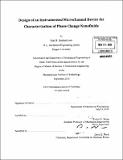Design of an instrumented microchannel device for characterization of phase change nanofluids
Author(s)
Suabedissen, Karl J. (Karl John)
DownloadFull printable version (16.38Mb)
Other Contributors
Massachusetts Institute of Technology. Dept. of Mechanical Engineering.
Advisor
Evelyn N. Wang.
Terms of use
Metadata
Show full item recordAbstract
As the energy needs of the world continue to grow, it becomes increasingly important to investigate alternative sources of energy. Solar energy is one of our most abundant sources of renewable energy, and researching ways to harness this energy is an area of great interest. While there are several different methods by which solar energy can be harnessed, including photovoltaics, low temperature collectors, and concentrated solar collectors, this investigation focuses on parabolic trough solar thermal power generation. Parabolic trough solar thermal power generation relies on parabolic shaped mirrors to concentrate sunlight on an array of pipes through which a heat transfer fluid flows. The heated fluid is subsequently used to drive a steam cycle to generate electricity. Two of the main challenges facing parabolic trough solar thermal power generation are high temperature stability of heat transfer fluids and thermal storage methods. The current fluids used for heat transfer can only withstand temperatures of up to 400C before undergoing thermal breakdown. The heat capacity of these fluids is also insufficient for them to act as an effective thermal storage mechanism during periods of low sunlight. This thesis explores a method of increasing the heat capacity of heat transfer fluids by introducing nanoscale phase change particles. A low temperature proof of concept is used to study nanosized particles of lauric acid which undergo phase change in water, which promises to increase the effective heat capacity by 16.4% using 10% volume fraction of particles. In order to characterize the heat transfer characteristics of the prepared phase change nanofluid, a heated microchannel was designed and fabricated. A microchannel with doped resistors as temperature sensors was microfabricated. The high temperature coefficient of resistance of doped silicon resistors allows for precise temperature measurements of 52.5 ohms/K. However, challenges with nanofluid stability and drift of the doped sensors limited further detailed investigations. This work is the first step towards developing nanofluids and characterization tools to demonstrate the feasibility of such fluids for parabolic trough solar thermal power generation.
Description
Thesis (S.M.)--Massachusetts Institute of Technology, Dept. of Mechanical Engineering, 2010. Cataloged from PDF version of thesis. Includes bibliographical references (p. 102).
Date issued
2010Department
Massachusetts Institute of Technology. Department of Mechanical EngineeringPublisher
Massachusetts Institute of Technology
Keywords
Mechanical Engineering.